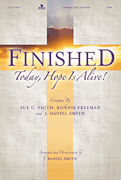
I've probably written close to 150 songs with Joel since then, but there are none more special to me than "He Loved Me With The Cross." I'm so thankful to have been part of writing it, and thankful to Larnelle for singing it so beautifully.
“A poet is, before anything else, a person who is passionately in love with language.”
W.H. Auden
 Although it's over 20 years old, this song is still one of my favorite songs I've been part of writing. I know the idea was Joel Lindsey's, and I can remember so many details of that writing session. I've probably written close to 150 songs with Joel since then, but there are none more special to me than "He Loved Me With The Cross." I'm so thankful to have been part of writing it, and thankful to Larnelle for singing it so beautifully.  Psalms 113-118 (called The Hallel) are used during the celebration of the Passover meal. When you read these psalms, it's impossible not to be moved to imagine Jesus singing those verses, celebrating that last Passover before His crucifixion. "The pains of death surrounded me, and the pangs of Sheol laid hold of me; I found trouble and sorrow. Then I called upon the name of the LORD: 'O LORD, I implore You, deliver my soul!'" (Psalm 116:3-4) "For You have delivered my soul from death, My eyes from tears, and my feet from falling. I will walk before the LORD in the land of the living." (Psalm 116:8-9) "I will take up the cup of salvation, and call upon the name of the LORD. I will pay my vows to the LORD now in the presence of all His people. Precious in the sight of the LORD is the death of His saints." (Psalm 116:13- 15) To me, it is most amazing to think of Jesus and His disciples leaving the upper room singing Psalm 118:24. As David and I were writing the lyric to this evening's song, we could not get over that. Jesus, the hours dwindling before His arrest, trial, beating and crucifixion, before He would bear our sins on the cross, could sing, "This is the day that the Lord has made; let us rejoice and be glad in it." We tried to write words that would reflect His agony, the desire not to have to "drink the cup" the Father had poured out for Him, and His faithful surrender to His Father's will. We also tried to make this a song of personal surrender for each one of us, especially when we are called to share in the "fellowship of His suffering."  Because I'm a lyricist, people sometimes ask if I'm ever surprised or even disappointed with the melody someone writes for one of my lyrics. My answer is that I'm almost always surprised and almost never disappointed. This song is a favorite of mine because I sent the lyric to Russell Mauldin—we needed a song for the Last Supper/Garden of Gethsemane slot in a musical—and when I heard the melody he had written, I don't know how I could've been happier. I love the way it turned out. Thanks, Russell! The disciples were arguing about who would sit at Jesus's side when He came into His kingdom. I wonder how often they reflected back on that stupid argument after the cross? Anyway, Jesus gave them a vivid demonstration of what it means to be great, what it means to be a leader. Wouldn't we all be blessed if our leaders followed His example. Wouldn't things work out better for each one of us if we learned how to serve the way He did.  I need to apologize to Charles Wesley. Travis and David and I wanted to use his great hymn "And Can It Be That I Should Gain" in our Easter musical Jesus, Only Jesus. We added a new chorus and a new verse, and we tweaked just a few words to make them more accessible to a 2014 audience. If I had read this first, however, I'm not sure I would have. In the preface to a 1779 collection of hymns, Wesley wrote: "I beg leave to mention a thought which has been long upon my mind, and which I should long ago have inserted in the public papers, had I not been unwilling to stir up a nest of hornets. Many gentlemen have done my brother and me (though without naming us) the honour to reprint many of our hymns. Now they are perfectly welcome to do so, provided they print them just as they are. But I desire they would not attempt to mend them, for they are really not able. None of them is able to mend either the sense or the verse. Therefore, I must beg of them these two favours: either to let them stand just as they are, to take things for better or worse, or to add the true reading in the margin, or at the bottom of the page, that we may no longer be accountable either for the nonsense or for the doggerel of other men." I hope when I meet him in Heaven, he's not ticked off at me. Maybe I'll tell him it was David and Travis's idea. For the sake of clarity, here is Charles Wesley's original, beautiful lyric: And can it be that I should gain An interest in the Savior’s blood? Died He for me, who caused His pain-- For me, who Him to death pursued? Amazing love! How can it be, That Thou, my God, shouldst die for me? Amazing love! How can it be, That Thou, my God, shouldst die for me? ’Tis mystery all: th’Immortal dies: Who can explore His strange design? In vain the firstborn seraph tries To sound the depths of love divine. ’Tis mercy all! Let earth adore, Let angel minds inquire no more. ’Tis mercy all! Let earth adore; Let angel minds inquire no more. He left His Father’s throne above So free, so infinite His grace-- Emptied Himself of all but love, And bled for Adam’s helpless race: ’Tis mercy all, immense and free, For O my God, it found out me! ’Tis mercy all, immense and free, For O my God, it found out me! Long my imprisoned spirit lay, Fast bound in sin and nature’s night; Thine eye diffused a quickening ray-- I woke, the dungeon flamed with light; My chains fell off, my heart was free, I rose, went forth, and followed Thee. My chains fell off, my heart was free, I rose, went forth, and followed Thee. Still the small inward voice I hear, That whispers all my sins forgiven; Still the atoning blood is near, That quenched the wrath of hostile Heaven. I feel the life His wounds impart; I feel the Savior in my heart. I feel the life His wounds impart; I feel the Savior in my heart. No condemnation now I dread; Jesus, and all in Him, is mine; Alive in Him, my living Head, And clothed in righteousness divine, Bold I approach th’eternal throne, And claim the crown, through Christ my own. Bold I approach th’eternal throne, And claim the crown, through Christ my own.  I've always loved the story of Jesus raising Lazarus from the dead. Mary and Martha sent for their friend, but Jesus delayed coming. Lazarus died, and his sisters didn't understand why the rabbi they loved, the one they knew could heal the sick, didn't show up to heal their brother. You can hear the accusation first in Martha's voice, then Mary's. "Lord, if you had only been here..." Jesus had them take him to the tomb. Here's the story from John 11: “Roll the stone aside,” Jesus told them. But Martha, the dead man’s sister, protested, “Lord, he has been dead for four days. The smell will be terrible.” Jesus responded, “Didn’t I tell you that you would see God’s glory if you believe?” So they rolled the stone aside. Then Jesus looked up to heaven and said, “Father, thank you for hearing me. You always hear me, but I said it out loud for the sake of all these people standing here, so that they will believe you sent me.” Then Jesus shouted, “Lazarus, come out!” And the dead man came out, his hands and feet bound in graveclothes, his face wrapped in a headcloth. Jesus told them, “Unwrap him and let him go!” I just love thinking about what happened next. What did Lazarus do when those wrappings fell away? I couldn't help myself. I had to write a song about it, and I asked Joseph Habedank and Tony Wood to help me do it. Karen Peck & New River recorded it last year, and it makes me so happy every time I hear it.  A few years ago, I was asked to write an Easter musical with Ronnie Freeman. J. Daniel Smith was going to arrange it. Awesome. The only problem was that Ronnie was getting ready to leave Nashville for the summer, and so the writing work had to be mostly done in one week. We both cleared our calendars. We had a few songs we had already written together that we decided to include, and Ronnie had written a song with some other writers that would become the title. Basically, we had 5 or 6 songs to write. That seems do-able in a week. This is one of the first. When you co-write much and later hear a song played back, you often hear the voice of your co-writer in your head, not what's actually on the recording. That is certainly true for me with this song. I hear Ronnie singing, see him sitting at the piano in a little writer's room at Brentwood-Benson. And I remember the conversation that led to the song: What kind of king chooses to die for those He is sovereign over? It's the question we ask with utter disbelief before we are saved, and the one we ask with thanksgiving once we know Jesus. Romans 5:6-8 says: "When we were utterly helpless, Christ came at just the right time and died for us sinners. Now most people would not be willing to die for an upright person, though someone might perhaps be willing to die for a person who is especially good. But God showed his great love for us by sending Christ to die for us while we were still sinners." "King of all kings. Christ is His name. Let every knee bow, every tongue proclaim. He is the King of Heaven!"  Matthew 21 1 As Jesus and the disciples approached Jerusalem, they came to the town of Bethphage on the Mount of Olives. Jesus sent two of them on ahead. 2 “Go into the village over there,”he said. “As soon as you enter it, you will see a donkey tied there, with its colt beside it. Untie them and bring them to me. 3 If anyone asks what you are doing, just say, ‘The Lord needs them,’ and he will immediately let you take them.” 4 This took place to fulfill the prophecy that said, 5 “Tell the people of Jerusalem, ‘Look, your King is coming to you. He is humble, riding on a donkey-- riding on a donkey’s colt.’” 6 The two disciples did as Jesus commanded. 7 They brought the donkey and the colt to him and threw their garments over the colt, and he sat on it. 8 Most of the crowd spread their garments on the road ahead of him, and others cut branches from the trees and spread them on the road. 9 Jesus was in the center of the procession, and the people all around him were shouting, “Praise God for the Son of David! Blessings on the one who comes in the name of the Lord! Praise God in highest heaven!” 10 The entire city of Jerusalem was in an uproar as he entered. “Who is this?” they asked. 11 And the crowds replied, “It’s Jesus, the prophet from Nazareth in Galilee.”  I finished listening to Bossypants by Tina Fey on my drive home yesterday. (Thanks, Chris Unthank, for telling me I should.) I loved it and laughed out loud many times. I'm not giving it a unqualified recommendation here because some of you might be offended by some profanities in it. On the other hand, if you watch much TV or see R-rated movies, it's nothing you haven't heard. What I thought as I listened was that the author was open and honest about her flaws, insightful about life in general, and has a pretty down-to-earth, traditional view on many things. Besides, she is just very, very, very funny. The reason I bring the book up at all is what she talks about in Chapter 24—The Rules of Improv. (I'm struggling with whether to refer to her here as Tina, which makes it sound like we are friends, or Fey, which makes me sound like a newspaper reporter. So I am opting for TF for the rest of this post.) TF's first professional "acting" gig was with a touring company of Second City, a famous improv group. As she began talking about the rules of improv, I thought to myself, "It's exactly like co-writing!" See if you agree. THE RULES OF IMPROV 1. RULE ONE: Agree. Always agree and say yes. According to TF, if your partner begins a scene with "Freeze, I have a gun," you are not supposed to respond with, "That's not a gun, it's your finger." Yes, of course. In a co-write, if your co-writer says, "What if we write a song about the beauty of grace," your first response can't be, "I just wrote about grace yesterday, so I don't want to write about it again today" or "The word 'grace' isn't really in right now." In other words, your first reaction should never be "no." I know there are writers who pull the "What else you got?" card on a young co-writer. I wouldn't, couldn't EVER do that. And I don't recommend it for anyone, ever. Start by agreeing at least on some level. Don't let your first reaction be "no." 2. RULE TWO: Say "yes... and." Add something of your own. Don't be afraid to contribute. Add something to the conversation. If your partner says, "Freeze! I have a gun," you might add, "Not the gun I gave you for Christmas!" You're already ahead of me here, aren't you. My job as a co-writer is to put my ideas out there, not bring the conversation to a screeching halt. I might say, "We could write about grace. We could write about the way grace changes a person from the inside out. Or maybe we just write about being changed." (See what I did there? I ever so subtly threw my idea out on the table, hopefully without making my co-writer feel rejected.) 3. RULE THREE: Make statements. Don't just ask questions all the time. Don't put all the pressure on your partner to move things forward. Be part of the solution. Some co-writes can end up with you spending lots of time discussing who's looking, what they're looking for, why you should aim for one artist rather than another, where the market is heading, what radio wants, why you should write up tempo rather than a ballad... an endless of analysis of how and what to write. Sooner or later it all comes down to writing what you are passionate about. Just write a great song. The rest will somehow take care of itself. I can't prove this is always true, but even if it isn't, I know I would rather leave a co-write feeling like I was part of a great song, not simply a commercially viable song. 4. RULE FOUR: There are no mistakes, only opportunities. According to TF, you can't do it wrong in an improv if you're doing the first three things, so relax. I wonder if TF has ever used the expression "Dare to suck?" Rule number four is what we live by. The line you think is all wrong, might just be what sparks the right idea or line from your co-writer. You can't do it wrong. Relax, be brave, and have fun. So thank you very much, Tina Fey, for a fun insight into improv and a great reminder about the rules of co-writing! And thanks for making my drive back to St. Louis yesterday really fly by!  I'm bringing candy corn to my co-write on Tuesday. It's my co-writer's favorite, so I made a stop at the candy store, and $5 worth of whatever it's made of is safely tucked away in my purse, just to get things off to a happy beginning. Sometimes you do stuff like that for a co-writer. You call ahead to see what they'd like from Starbucks. You don't use mayo on your sandwich, cause you know it makes them nauseous. I've babysat a few times, and I've driven through snow and ice to keep an appointment. I've let people off the hook when they've stood me up (and I've needed that kind of grace from others more than once). Once I flew to Oklahoma so I could ride back to Nashville with Dave Clark. That's maybe the craziest thing I've ever done for a co-writer. If you've done much co-writing, you could probably tell a few war stories about stuff you've done for people you write with. Though some things fall in the category of "above and beyond," most fall under "common courtesy." There are a few things co-writers have a right to expect from each other: 1. Presence and preparation. Show up with ideas and be fully engaged in the co-write. 2. Honesty and kindness. Speak up and say what you really think, but make the room a safe place where everyone can "dare to suck." 3. Confidentiality. What happens in the writing room, stays there. 4. Effort during the co-write and follow-through after it. I kind of think that almost any issue that comes up between co-writers can be solved by referring back to these four guidelines. Then again, I guess you could say the same thing about almost any issue that comes up between people.  There are seasons for me when finding ideas is difficult. That's scary because I start to feel like maybe I'm at the end of my writing. There are other seasons when somehow I notice ideas in every conversation, in every book I'm reading, on every billboard I pass, in every movie I watch... Those are happy times because as long as I have a steady flow of ideas, I feel like I'll find a way to write them. I know that if you're a songwriter, you know exactly what I mean. When I am empty of ideas (and everything else) I turn to God's Word. By that I don't mean that I read the Bible for song ideas. But they always show up when I am reading. I start in Genesis in January, and make my way through the Bible, doing my best to finish by the year's end. I find help, strength, joy, peace, understanding... and song ideas. I'm not consciously "trolling" for them the way I sometimes do on Twitter or Facebook, but they begin to reveal themselves as I read consistently. When an idea shows up, I write it in the margins, sometimes even beginning the lyric there, and sometimes it's fun to leaf back through the pages and see how something I jotted down later became a song. Here's picture of a page from Mark 14 from last year. Jesus was on trial, and the high priest asked if He was the Christ. Jesus answered, "I am; and you shall see the Son of Man sitting at the right hand of power, and coming with the clouds of Heaven." (Mark 14:62) I don't fully appreciate what "Son of Man" means every time Jesus used it, but I know it was His favorite description of Himself. So I began writing in the margins about how amazing it is to have the Son of Man seated at the Father's right hand interceding for us. Later I finished the song with David Moffitt and Travis Cottrell. My point is: Find what inspires you and return there often. Find a way to keep your ideas when they show up. Make enough of a start on the writing to capture the inspiration. If you only write down the title, thinking you'll remember how and why those words moved you, it might be hard to get back to that place in your mind and heart. Live like a songwriter, looking for your next idea to show up at any moment. Here's the finished song: |
sue c. smith• Staff songwriter for Universal/Capitol CMG Publishing Archives
July 2017
Categories |